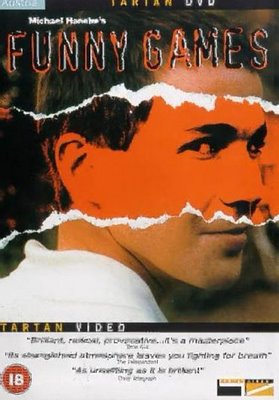
The neo-con gang has been getting lots of bad press these days, even by their standards. One of their star ideologues Francis Fukuyama, he of the "End of History" fame, has now deserted their camp and has been calling his earlier friends and fellow-travellers "Leninists" and other such bad names. I was at the book store just the other day and I saw the cover of Fukuyama's new book, in stark black, almost reminding of the other famous black book.
I remember picking up the End of History book many years ago at my college library thinking it to be a book about apocalypse or the end of the world or something. I was very disappointed then that the book turned out, not to be about those interesting things but was instead full of rather boring and dense ideas (and at that time I had no clue who Hegel was or what the word "dialectics" meant, actually I still don't). The central idea being that, now that the Berlin wall has fallen we can all live in peace. Everywhere now it will be democracy, prosperity and harmony and of course, capitalism. This has been the destiny of mankind all along and now it is time to fulfill it. I got bored as hell just by thinking about it. Thank God, the theory proved to be ridiculously wrong. People still kill each other for stupid reasons and doubtlessly will go to war for defending equally ridiculous things. If given free choice some people would rather live under a theocratic tyranny and religious law instead of choosing "liberal democracy" and capitalism. There are still young girls in western countries who will fight for their "rights" to cover themselves in shapeless tents (or "jilbab") just because their religion tells them to do so. Such naive optimism! I never picked up the book again and I don't think I will ever.
There are some other end of history theories. Marx, of course, believed that Capitalism with its inherent contradictions will collapse one day and pave the way for a classless society where people wouldn't need to specialise and which would give them freedom "to hunt in the morning, fish in the afternoon, breed cattle in the evening, criticize after dinner, just as I like, without ever becoming a hunter, a fisherman, a herdsman, or a critic." Actually, I like this idea very much but like all utopian ideas, I don't think it is going to work out very well. Adam Smith was right, Marx was wrong. There is no getting away from specialisation and the chains of labour.
The scientists also ponder on this thing but then they take it to extreme and focus on the end of the world itself. There is still a lot of debate among theoretical physicists about whether the world will end in infernal fire or deathly chill. But one thing they all agree on...the scenario of that happening is just too remote. This Slate article has more details if you are interested.
Yeah, I know all know all this sounds too dense and boring. So here comes the funniest theory, and not surprisingly, it is from religion. The Christians believe that when the end of the world comes, and the born-again types think that the time has already come, Jesus will come back to save the believers and take them to heaven from where, as this rather cheeky Economist article says, "they will have the best seats in the house as the unsaved perish in a series of spectacular fires, wars, plagues and earthquakes." I really like this theory. Great dramatic potential! Just check out what Bergman did with it in The Seventh Seal. What a great movie! (I don't know if there is any eschatological tradition in the Hindu thought, or perhaps we are skeptical of the existence of material world itself (Maya) thus preempting the questions of creation and destruction?)*
All of this is too theoretical. For all practical purposes and specially for people like us, who are living a life of comparative affluence in the west, free of material needs and are typing away ridiculous things on their keywords in the middle of the night, like I am doing now, just because they have got an internet connection and have nothing else to do, the end of history has already arrived. And Nietzsche knew this more than a hundred years ago. No, it is not the "Ubermensch", it is the theory of "the last man". In Thus Spake Zarathustra Nietzsche says:
"I say unto you: one must still have chaos in oneself to be able to give birth to a dancing star. I say unto you: you still have chaos in yourselves.
Alas, the time is coming when man will no longer give birth to a star. Alas, the time of the most despicable man is coming, he that is no longer able to despise himself. Behold, I show you the last man.
'What is love? What is creation? What is longing? What is a star?' thus asks the last man, and blinks.
The earth has become small, and on it hops the last man, who makes everything small. His race is as ineradicable as the flea; the last man lives longest.
'We have invented happiness,'say the last men, and they blink. They have left the regions where it was hard to live, for one needs warmth. One still loves one's neighbor and rubs against him, for one needs warmth...
One still works, for work is a form of entertainment. But one is careful lest the entertainment be too harrowing. One no longer becomes poor or rich: both require too much exertion. Who still wants to rule? Who obey? Both require too much exertion.
No shepherd and one herd! Everybody wants the same, everybody is the same: whoever feels different goes voluntarily into a madhouse.
'Formerly, all the world was mad,' say the most refined, and they blink...
One has one's little pleasure for the day and one's little pleasure for the night: but one has a regard for health.
'We have invented happiness,' say the last men, and they blink."
Yes, the time that Nietzsche was talking of has come. And the despicable men are no one else but pathetic people like me and you, who are jobless enough to read and write ridiculous things like this. I depise thee will all vehemence, the last man!
Endnote: I can not express in words the kind of intense longing I feel every morning just after I wake up for an apocalypse and doom. How I wish a comet would strike the earth and boom...everything will end in an instant. But I know it is not going to happen and then with a heavy heart start my day, every freaking day! And this is what I pray before I go to sleep: O Dear Almighty! If not a comet strike, at least send some horrible disease on our way which wipes off the entire human species quickly and end this meaningless drama (which signifies nothing anyway). Spare the plants and other animals. Let them live as they choose. But Human Beings don't deserve this luxury of existence. They don't.
P.S. I wanted to write a meaningful post about the war in iraq and american foreign policy but got sidetracked. Now I must go to sleep. Will write some pompous stuff about foreign policy later.
*I remember now. Hinduism has this trinity of Brahma, Vishnu and Mahesh who are creator, preserver and destroyer respectively. and there is some stuff in the rig veda too about the creation of the universe. so there.







